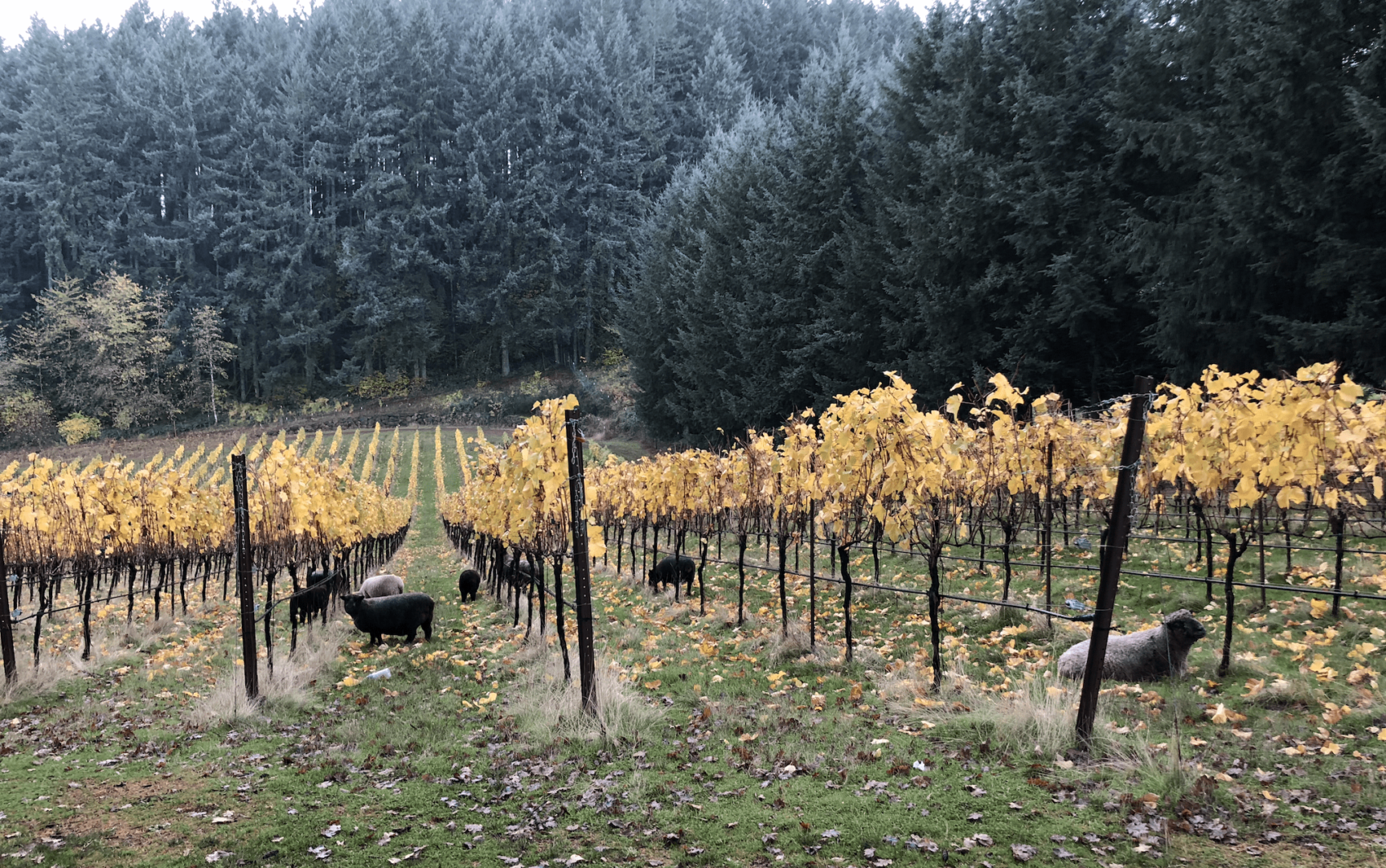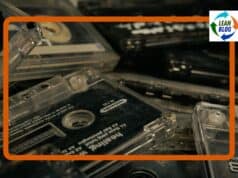My wife and I, in normal times, love visiting wineries. The Willamette Valley of Oregon is one of our favorite places to visit and we love the wines from that region.
My wife recently got an email update from a winery we get shipments from, Native Flora in Newberg, Oregon. We have visited there before and it's a gorgeous place. Here is a photo I took about three years ago:

And here is a photo of their vineyard… and yes, those are sheep:

I'm sure you are aware of the severe wildfires that the west coast, including Oregon, have been suffering through recently. My sympathies go out to all of those who have been affected and to those whose loved ones have been lost.
Among other harm and damage, many winery properties have been threatened by the fires — one in southern Oregon was destroyed, sadly. Many have also been directly impacted in northern California, with vineyards or winery buildings being damaged or destroyed by fire.
Native Flora has faced the effects of smoke in the air affecting the grapes on the vine. We have had California wines from years when wildfires were bad. Sometimes you can taste smoke in the glass — a little bit might make the wine a bit more interesting, but too much smoke can ruin the product.
Scott and Denise Flora, owners of Native Flora shared:
“The big wine story of 2020 is the massive fires endured by the western states this summer. We were not spared. The nearest major fire stopped about 3 miles from us, but we were engulfed in heavy smoke for 8 days. The smoke has had an impact.”
They then needed to determine what the impact would be. They aren't explicitly practicing Lean thinking, but I see some parallels.
They have what my Toyota mentors call “a big vague concern.” The next step is to investigate the situation to learn more to see if it's really a meaningful problem or something minor.
The Floras continue:
“We ran micro-ferments last week to test, and there is smoke impact both in aromatics and flavor, but we are pressing ahead.”
They aren't giving up on the 2020 vintage yet. There is still more to learn. It's not good to give up or leap to a conclusion too quickly in any problem solving efforts.
“This crop was nothing short of stellar coming into the fires, and still has superb natural chemistry hanging on the vine. Our intention is to harvest a good portion and learn.”
They don't know the answer. They have to work to figure things out. That's often the case in our own workplaces, healthcare or otherwise.
They aren't going to spend time right now on the “root cause” of the fires (that's for others to learn from and remove preventable causes). But Native Flora is going to try and evaluate what I would call countermeasures.
“We have the opportunity to try numerous remediation strategies before, during and after ferment. They might all end in failure, but the knowledge gain will be tremendous.”
I appreciate that they are focusing on learning. Yes, they want to save the crop because they face a huge financial loss if they can't have a 2020 vintage.
“Bottom line – if the finished wine doesn't measure up to our standards – our label will never go on the bottle.”
I appreciate that they won't let their quality standards suffer, even in the face of a potential disaster like this for their business. If they released a bad wine in a few years with the 2020 grapes, the damage to their reputation and name might be greater than the damage of not having a release.
Short-term pain can be survivable, perhaps, while the long-term pain of losing your reputation might be deadly.
Principle #1 of “The Toyota Way” focuses on the long term:
“Base your management decisions on a long-term philosophy, even at the expense of short-term financial goals.”
Native Flora seems to take this approach and they might have to be even more creative with their countermeasures and action plan, as they say:
“If all else fails, we are one of the few Oregon wineries who also holds a distillery license (surprise!) – can you spell “brandy” and “port”?”
One other challenge of wine making (or whiskey making) is that experiments and cycles of learning are often, by nature, very slow.
“For fun and the future, we're planting Chenin Blanc and Malbec this Fall! Madness or prescience? We'll know in 4 years!”
I really hope things work out for the Floras and Native Flora… fingers crossed.
Comments from Scott Flora
Here are some thoughts from email exchange, shared with permission:
“I think the ideas and philosophies you're promoting are spot on. Our decline in manufacturing and corporate leadership, I think, is directly tied to the growth in shareholder return management. When you stop looking at the end consumer and market needs, instead focusing on rewarding yourself and shareholders with quick returns, you lose your competitive and efficiency edge.
Manufacturing moves away, technical innovation dies, companies are broken up for their pieces, a dead end cycle ensues. I fought it furiously in the corporate world for 20 years, with companies that no longer exist.
I think it's exceptionally fun to run a tiny business exactly the way we want — focus on product quality and consumer desires, run efficiently and innovate. We understand our operational and fiscal parameters, price accordingly, run sustainably, are growing steadily and remain highly profitable.
Ironically, we're regarded as a complete rebel business model for our industry, are underpriced according to our competitive set, and might be, on a percentage basis, the most profitable winery in Oregon. And, we have a lot of fun with our customers doing what we do.
If I'm wrong, I like being wrong.”
Thanks, Scott!
Please scroll down (or click) to post a comment. Connect with me on LinkedIn.
Let’s work together to build a culture of continuous improvement and psychological safety. If you're a leader looking to create lasting change—not just projects—I help organizations:
- Engage people at all levels in sustainable improvement
- Shift from fear of mistakes to learning from them
- Apply Lean thinking in practical, people-centered ways
Interested in coaching or a keynote talk? Let’s start a conversation.









![When Was the Last Time a Leader Around You Admitted They Were Wrong? [Poll]](https://www.leanblog.org/wp-content/uploads/2025/07/Lean-Blog-Post-Cover-Image-2025-07-01T212509.843-100x75.jpg)
Hi Mark-
It is so sad to hear about the devastation the west coast is going through with all of these wildfires. I never thought about how the smoke would affect the taste, I only considered the vineyard physically being affected by the fires. It’s interesting that they are practicing lean thinking and not even aware of it. First, they focused on meaningful problems or something minor, and using this time to still “harvest a good portion and learn”, and even if “numerous remediation strategies” fail, “the knowledge gain will be tremendous.” This particular vineyard winery will not put their label on something that does not meet their standards. Even though Native Flora and Toyota are two very different industries, they both focus on the long term of their companies. Native Flora has their distillery to fall back on and are even planting Chenin Blanc and Malbec for the future. Overall, great article and so interesting to see how creative and similar Toyota is to Native Flora. As a buyer of this winery, would you continue to buy from them if they continued to meet their standards yet the taste might differ? Thanks again for sharing!
Hi Abigail – Did you mean “meaningful problems or something major”?
I expect that there will be variation in a winery’s product from year to year… that’s one of the things that makes wine interesting. I trust Native Flora, and other top-notch producers, to sell something that lives up to their standards, even if it’s a little different than before.
Hello Mark,
I found your blog to be very interesting in how you compared Toyota and Native Flora comparing how they both value the long term of their companies and not the short term. By reading your article it really showed me that lean thinking is everywhere. It’s in every type of business no matter the field or how big and how small. I support any company that cares about their name and product instead of just making a quick buck. I’ll have to try this wine someday and hopefully I can see a future article regarding what the outcome of Native Flora is.
Hi Mark,
I appreciate you revealing this current situation Native Flora and many other vineyards face today. It makes you question, “Is this the new normal?” It is amazing to see the vineyard fallback on their distillery license in order to stay afloat. This just proves time and time again, “Supply Chain always finds a way.” However, will other vineyards out west be able to adjust their business model in time like Native Flora in order to stay economically stable? Will they be willing to change their core competencies? Only time will tell. The coming months will be intereting to see how the wine market prices will rise like many other perishable products. I reccomend posting a blog on how East Coast vineyeards will react to the rising demand of their wines. Thank you!
Dear Mark,
I would’ve never thought that wild fires are affecting the various vineyards on the West Coast. It is really sad to hear that their yearly harvest can cause harm to their product and can ruin their brand. I know that various distilleries around me have switched to producing hand sanitizer and less liquor to account for the lost sales. I wonder if the fires on the west coast will affect the price of wine in three to four years depending on how bad the fires impacted their grape yield. By the way the quotes you posted are worded it seems like they are in a positive mood and are optimistic about the future of Native Flora
Hi Mark,
This is a really insightful analysis of the current situation in wine country. Disruptions always occur in new ways, and this is certainly a first. It’s very interesting to see how the winery has pivoted in the face of the three-headed monster they’re facing with the fires, recession, and pandemic. The processes and thought processes they used to pivot are the same as lean’s thought processes. They are also thinking about the customer first, asking what their needs are, and making their decisions with the long term at the forefront. I really respect their dedication to a quality product even in the face of adversity. Thank you!
For those who have already read and commented, I recommend you go back and see the post update, with comments shared by Scott Flora.
A sad update from Schramsberg, a winery we love in Napa: